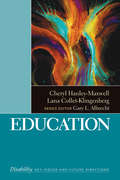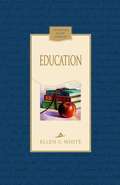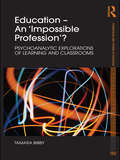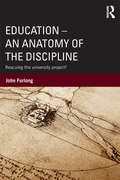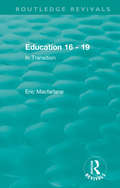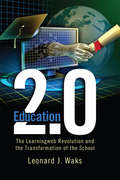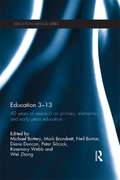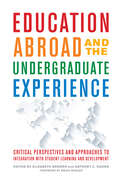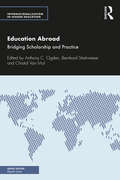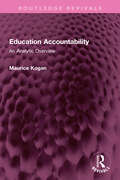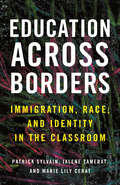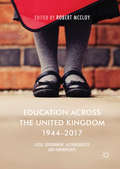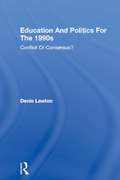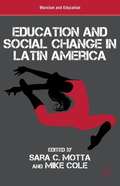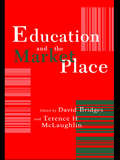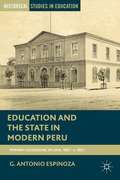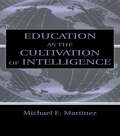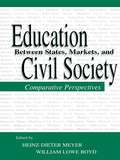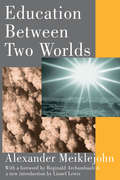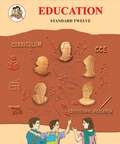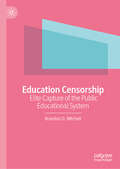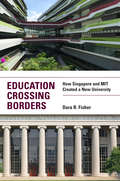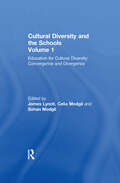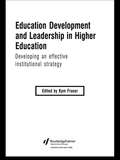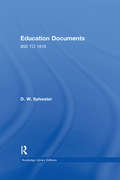- Table View
- List View
Education
by Cheryl Hanley-Maxwell Lana Collet-KlingenbergThis volume in The SAGE Reference Series on Disability explores education issues for people with disabilities and is one of eight volumes in the cross-disciplinary and issues-based series, which examines topics central to the lives of individuals with disabilities and their families. With a balance of history, theory, research, and application, specialists set out the findings and implications of research and practice for others whose current or future work involves the care and/or study of those with disabilities, as well as for the disabled themselves. The concise, engaging presentational style emphasizes accessibility. Taken individually, each volume sets out the fundamentals of the topic it addresses, accompanied by compiled data and statistics, recommended further readings, a guide to organizations and associations, and other annotated resources, thus providing the ideal introductory platform and gateway for further study. Taken together, the series represents both a survey of major disability issues and a guide to new directions and trends and contemporary resources in the field as a whole.
Education
by Ellen G. WhiteDiscover the secret to true education as your eyes travel over these vital principles recognizing God as Source and Teacher. Understand where many have failed, and live the truth that makes us free. Looking to obtain an advanced degree in Education? Gain fresh insight into the source of all learning and knowledge. Great instruction for those who teach others or for personal development. The book, Education, is a must read for any serious student of life.
Education - An 'Impossible Profession'?: Psychoanalytic Explorations of Learning and Classrooms (Foundations and Futures of Education)
by Tamara BibbyIn classrooms and lectures we learn not only about academic topics but also about ourselves, our peers and how people and ideas interact. Education – An Impossible Profession extends the ways in which we might think about these processes by offering a refreshing reconsideration of key educational experiences including those of: being judged and assessed, both formally and informally adapting to different groups for different purposes struggling to think under pressure learning to recognise and adapt to the expectations of others. This book brings psychoanalysis to new audiences, graphically illustrating its importance to understandings of teaching, learning and classrooms. Drawing on the author’s original research, it considers the classroom context, including policy demands and professional pressures, and the complexity of peer and pedagogic relationships and interactions asking how these might be being experienced and what implications such experiences might have for learners and teachers. The discussions will be of interest not only to teachers, leading-learners and teacher-educators, but also to individuals interested in education policy, professional practice and theories of education.
Education - An Anatomy of the Discipline: Rescuing the university project?
by John FurlongEducation – An Anatomy of the Discipline focuses on the development of the discipline of education, how it is understood and practised in contemporary universities, and the potential threats to its future. As the author, John Furlong argues, disciplines are not only intellectually coherent fields of study; they also have a political life, they are argued for, supported, challenged and debated. Nowhere is this more true than in the discipline of education. In this authoritative text, Furlong describes the history as well as the current state of the discipline of education in universities. He also explores the range of national and global changes that have helped to shape the discipline in recent years. Education’s final ‘arrival’ in the university sector coincided with major changes in universities themselves. Today, universities are very diverse institutions: they no longer have a sense of essential purpose and have largely accepted their loss of autonomy, especially in education where government intervention is particularly strong. If education is now fully integrated into universities, then, like the system as a whole, it urgently needs to find a voice, set out a vision for itself, and state what its purpose should be within a university in the modern world. The book therefore brings together four vitally important topics: -the changing nature of the university-the academic and scholarly study of education as a field -the professional education and training of teachers -the nature and organisation of educational research. Education – An Anatomy of the Discipline will occupy a central place in contemporary literature about education; although based on evidence from British universities, its implications are important across the world. The book will be invaluable reading for all professionals working in university departments and faculties of education as well as those with an interest in the changing role of the university in contemporary society.
Education 16 - 19: In Transition (Routledge Revivals)
by Eric MacfarlanePublished in 1993, this book considers the needs of older teenage students and the various forms of provision made for them. The 16-19 sector of education is a transition stage for students and a system in transition for educators. At a time of rapid change the author assesses the significance of current trends and recent legislation for managers, teachers and lecturers in schools and colleges catering for this age group. Eric Macfarlane argues that the 16-19 sector provides both a microcosm and intensification of the tensions, divisions and conflicting aims and objectives present throughout the education system as a whole. He explores the differences that exist between the academic and vocational routes to qualification, between the comprehensive, selective and independent systems and between ‘traditional’ and ‘progressive’ approaches to the learning process. The ideologies and policies that have produced the present system are traced and the case for reform examined. Different management tasks in 16-19 education are considered, with emphasis on current changes in strategies and structures. The book highlights the distinctive features of the various types of institution that provide for students aged 16-19 and the ways in which these distinctions are becoming blurred. The final chapters consider the future of 16-19 provision and the particular impact of the 1992 Further and Higher Education Act.
Education 2.0: The LearningWeb Revolution and the Transformation of the School
by Leonard J. WaksThirty years of spirited school reforms have failed to improve our schools and instead have left our public school systems in disarray. Meanwhile, employment prospects for high school and college graduates are fading, and the public is losing faith in its schools. The education paradigm inherited from the Industrial Era is in crisis. In the last decade, however, the Internet and new Web 2.0 technologies have placed the entirety of human knowledge in the hands of everyone. What will our educational institutions make of this unprecedented flood of Web-based learning resources? How can schools be transformed to accommodate the new possibilities for personal and social learning? Leonard Waks gathers all the pieces of our current educational puzzle together in this groundbreaking book. Drawing on new organizational models grounded in complexity theory, Waks maps out an inspiring new paradigm for education in the Internet age, and connects all the dots in constructing detailed models for new schools-now transformed into "open learning centers." Finally, Waks details action steps readers can take to speed this transformative process along in their own locations.
Education 3-13: 40 Years of Research on Primary, Elementary and Early Years Education (Education Heritage)
by Wei Zhang Neil Burton Mark Brundrett Michael Bottery Rosemary Webb Diane Duncan Peter SilcockPrimary education is one of the most important phases of learning but there remains a scarcity of in-depth research on this vital topic. However, as the focus on improving outcomes increases there is a growing interest internationally in research that helps us to understand the best ways to help young children engage with the curriculum in order that they may have the best possible life chances. This text helps to address these issues and consists of seminal articles derived from the forty-year history of the journal Education 3-13, which can claim to be one of the most important and influential publications in its field. The chapters included have been chosen carefully to represent a wide range of key topics in research on primary education and the text is sub-divided into five sections, each of which has been edited by leading academics who specialise in the topic under scrutiny. The sections include:• Learning and teaching, including the psychology and philosophy of primary education;• Key challenges in primary education, including changes to the governance of schools, and educational management and leadership;• The primary curriculum, including Maths, Science, IT and Technology Education;• The primary curriculum, including English, Humanities and the Arts; and,• Primary teachers’ work and professionalism. Many of the contributions are written by seminal figures in academic research. The text will be especially relevant to students and researchers engaged the study of primary education as well as to practitioners, advisers and policy makers and will prove an invaluable resource for those wishing to gain an overview of research into primary education. It is recommended especially for those who wish to understand the development of primary education and the many twists and turns in theory, practice and policy that have influenced its development over the period of a generation. Those who read the text will come across the origins of many of the ideas that continue to influence primary teaching today as well as very recent research on where we are now in this important subject area.
Education Abroad and the Undergraduate Experience: Critical Perspectives and Approaches to Integration with Student Learning and Development
by Anthony C. Ogden Elizabeth BrewerCo-published with This volume focuses on two questions. First, how can education abroad be embedded into undergraduate education so that students experience it as an integral component of their education and something they help shape, rather than as time away from their education and as a commodity to be consumed? Second, how can colleges and universities maximize the educational value of education abroad by forging stronger connections between it and other undergraduate experiences? The volume argues that learning abroad be positioned within the work of the larger institution and students’ overall education.Organized within three sections, this volume makes the case that learning abroad must be positioned within the work of the larger institution and students’ overall education. In doing so, it questions many current assumptions and stimulates thinking about the power of an integrative approach to education abroad to lead to lasting educative value. An integrative approach requires that students be afforded multiple opportunities and ongoing support to draw connections with their learning abroad with other dimensions of their undergraduate education.Chapters cover topics such as the additive value of integrating multiple HIPs with education abroad to span disciplinary boundaries and promote an array of soft or operational skills; the importance of maintaining the disruptive quality of the encounter with the foreign to enrich study at home; issues of commodification and reciprocity; increasing access to study abroad to community college--particularly adult--populations; facilitating students’ social and intellectual development, identity formation, and reflective practice; rethinking orientation programming to emphasize the continuity of learning pre-, during- and post-education abroad; asking fundamental questions about the purpose of education abroad to rethink assessment and its purposes; the faculty role in the internationalization of the curriculum; and developing more intentional relationships with in-field partners and international educational organizations to more effectively connect leaning abroad with other dimensions of undergraduate education.For everyone involved in international education – whether SIOs, faculty, department chairs or deans – the critical questions and new perspectives offered here will inform and shape the growing movement to integrate education abroad with the overall undergraduate experience.
Education Abroad: Bridging Scholarship and Practice (Internationalization in Higher Education Series)
by Anthony C. OgdenRecent decades have seen unprecedented growth in the number of students travelling abroad for the purpose of short-term academic study. As such, attention is turning to the role that education abroad can have in enhancing student learning and producing global-ready graduates. This volume provides a succinct and accessible analysis of the existing research and scholarship around the world on a range of important areas related to contemporary education abroad, providing practitioners with important implications for programming and practice. Focusing on fourteen key topics relating to education abroad, this accessible desktop compendium not only synthesizes what is already known, but also indicates which topics need further research and how the existing literature can be applied to daily programming and practice. Extending beyond student learning outcomes to look at essential topics such as institutional outcomes, program models, and host community outcomes, this volume covers major trends in contemporary research as well as an assessment of the methodological and design challenges that are common to education abroad research. The fourteen distinct topics address the broad themes of participation, programming, student outcomes, institutional outcomes and societal outcomes, and include chapters from a broad range of widely acknowledged and respected international experts. Bridging the gap between scholarship and practice, this accessible guide is essential reading for anyone working in higher education today and involved in shaping and managing education abroad programs. It is useful for all who want to understand and leverage existing research to inform education abroad programming and practice.
Education Accountability: An Analytic Overview (Routledge Revivals)
by Maurice KoganFirst published in 1986, Education Accountability is a critique of writing on accountability and evaluation with respect to education and its various stakeholders. The author applies frameworks drawn from the theory of knowledge, social psychology and social policy, demonstrating how different assumptions about the nature of schooling, curriculum control and development can give rise to various forms of political control, of which education accountability is a special and important case. This sharp book will be valuable reading for all advanced students of education, whether interested in curriculum or educational administration, as well as to students of political science, social policy and evaluation studies, teacher trainers, administrators and educational researchers.
Education Across Borders: Immigration, Race, and Identity in the Classroom (Race, Education, and Democracy)
by Marie Lily Cerat Patrick Sylvain Jalene TameratA critical resource for K-12 educators that serve BIPOC and first-generation students that explores why inclusive and culturally relevant pedagogy is necessary to ensure the success of their studentsFor readers of White Folks Who Teach in the Hood…And The Rest of Y&’all Too, Education Across Borders is a strong teacher development resource for white educators who serve BIPOC students and are looking for culturally relevant pedagogies that value the diverse experiences of their students. The practices and values in the U.S. educational system position linguistically, culturally, and socioeconomically diverse children and families at a disadvantage.BIPOC dropout rates and levels of stress and anxiety have linked with non-inclusive school environments. In this collection, three educators and will draw on their experiences as immigrants and educators to address racial inequity in the classroom and provide a thorough analysis of different strategies that create an inclusive classroom environment.With a focus on Haitian and Dominican students in the U.S., the authors will reveal the challenges that immigrant and first-generation students face. They'll also offer insights about topics such as: • How do language policies and social justice intersect? • How can educators use culturally relevant teaching and community funds of knowledge to enrich school curriculum? • How can educators center the needs of the student within the classroom? • How can educators support Haitian Creole-speaking students?
Education Across the United Kingdom 1944–2017: Local Government, Accountability And Partnerships
by Robert McCloyThis book provides a comprehensive understanding of how education has developed over the last 70 years within the United Kingdom. As education in Wales and Scotland continues to develop following increasing devolution, the contributors draw from personal accounts and practical experience to provide a comparison and evaluation of these differences. A critical stage in the history of education has been reached, particularly in light of the decision for Britain to leave the European Union: the authors explore the emergent fault lines and identify practical reforms. While this book will undoubtedly be of interest to educational historians, it will also be a valuable reference point for educationalists, practitioners and politicians. The contributors unpick the larger role of education in the United Kingdom and propose practical ways forward amid a time of crisis.
Education And Politics For The 1990s: Conflict Or Consensus?
by Denis LawtonExamines the ideological differences between the education policies of the two main political parties in the UK and discusses the emergence of these differences within the context of the 1988 Education Reform Act. It also looks at the world-wide influence of the "New Right" politics on education.
Education And Social Change In Latin America
by Mike Cole Sara C. MottaThis book examines the multiple relationships between education, pedagogy, and social change in Latin America and beyond through a discussion of critical theory in education and its uses in Latin American society today. An international group of contributors discuss both individual countries and the region as a whole.
Education And The Market Place (Education Policy Perspectives Ser. #No.37)
by Terence H. McLaughlinThis collection of essays debates the application of market principles to and within the context of education. The contributors are all leading figures in their field, presenting their ideas in an accessible style to the lay reader. Throughout, the educational and public policy issues raised by the application of market principles to education are closely examined.
Education And The State In Modern Peru
by G. Antonio EspinozaEducation and the State in Modern Peru illuminates how education was the site of ideological and political struggle in Peru during its early years as an independent state. Spanning 100 years and discussing both urban and rural education, it shows how school funding, curricula, and governance became part of the cultural process of state-building in Peru. Drawing on detailed historical research and data, G. Antonio Espinoza analyzes the factors that affected the development of primary schooling in the capital city of Lima and the surrounding provinces between 1821 and 1921. He focuses not only on state intervention, but also on key societal elements that affected the development of education during this century, including social demand for education, prevailing educational ideas, cultural change, and patronage.
Education As the Cultivation of Intelligence (Educational Psychology Series)
by Michael E. MartinezMartinez defines intelligence from a cognitive perspective as a repertoire of those skills, strategies, and knowledge structures that are most instrumental in human effectiveness. He posits that in today's complex, fast-paced, technologically dense, and information-rich society, intelligence is the supreme human resource. The current social context not only demands intelligence, but rewards it economically, psychically, and in other ways. His central argument in this book is this: The intellectual abilities that are crucial to modern life, including economic viability and effectiveness in daily living, correspond to the cognitive functions that are reasonably called intelligence; these intellectual abilities are learnable; we now know enough about the structure and mechanisms of intelligent thought and behavior to teach them directly. Martinez explicates his argument and provides research-based evidence to support his claim.
Education Between State, Markets, and Civil Society: Comparative Perspectives (Sociocultural, Political, and Historical Studies in Education)
by Heinz-Dieter Meyer William Lowe Boyd*How should education be organized in pluralistic and multicultural societies? *What are the roles in education of civil society, markets, governments, and the family? *How can the idea of the civil society help to reorient education policy discussions that are sometimes stuck in either-or juxtapositions of "market versus government" or "individualism versus communitarianism?" *What are some of the traditions of civil society--across countries and across history--that educators and policymakers today can revive or build on? These questions are at the center of this book. Its goal is to understand how we can accommodate cultural, ethnic, and religious pluralism in a political and conceptual framework that is sufficiently flexible to combine choice with equity, a commitment to a shared civil and political culture with openness to exploring and affirming the distinct ethnicity, race, creed, or culture of different groups. To address these questions, the authors take up the notion of the civil society, an idea that has experienced a popular and scholarly revival in recent years as numerous citizens, action groups, political philosophers, and social scientists make the case that only a democratic civil society can sustain a democratic state. The implications of this development for education have to date been very little explored. This book is a step toward addressing this gap. Going beyond simple juxtapositions of "market versus government" in education reform, the book as a whole develops an integrative perspective informed by the idea of the civil society. It combines current policy issues with a look at their historical development, and evaluates U.S. educational policy in the context of a range of international cases. The authors--education scholars, sociologists, economists, historians, and philosophers-- explore from diverse disciplinary, political, and philosophical points of view, the potential of the civil society and civic associations for education. At the same time, they share the hope that a thorough reconsideration of the role of the state, the market, and the civil society will help to energize ongoing experiments with charter schools, voucher schemes, and a variety of other plans to increase educational and school autonomy.
Education Between Two Worlds (Essay Index Reprint Ser.)
by Alexander MeiklejohnWritten in the midst of World War II, this book makes a strong argument for the crucial importance of education as the solution to the dilemmas with which our Anglo-Saxon culture was nurtured, with particular emphasis on the work of John Dewey and Jean-Jacques Rousseau."The schools with which this argument is concerned are those of the Anglo-Saxon democracies of the last three centuries. In the life of England and America as we now know them, three hundred years of cultural change have moved on to a culminating and desperate crisis. That culture, in its religious and moral aspects, we have called Protestantism. On the economic and political side it has appeared as Capitalism. And these two together have established and maintained a way of life which we describe as Democratic. This book is devoted to an attempt to understand the education which is given by Anglo-Saxon democracies, to study the learning and teaching which have been done by a Protestant-capitalist civilization." ufrom the Preface.As the original foreword by Reginald Archambault indicates, "Fundamentally this is a book about education written by an educator who was anything but conservative and never merely theoretical. He is interested not only in educational theory but also in educational policy, and indeed, in pedagogy. The volume is invaluable, then, for the student of education, for it sheds critical light on the classic conceptions of education for the poor, and provides a heuristic statement of direction for the future." Stringfellow Barr, writing for the New Republic, indicates that this is "A wise and courageous book. I do not know how anybody concerned with education can ignore it." Mark van Doren in the Nation said, "As many readers as are interested in human happiness should go through this bookafor it is concerned with as important a theme as any I can imagine."
Education Book class 12 - Maharashtra Board
by Maharashtra State Bureau of Textbook Production and Curriculum ResearchEducation is a very progressive and research based knowledge discipline. Hence there has been a constant addition of new knowledge and concepts in the content of Education. Similarly Education being an interdisciplinary subject, there seems to be give and take of knowledge from various other subjects. Through this, Education is becoming an enriched subject. Useful for students who are going to enter in the field of Education in educational or professional future, and if they are intending to become a teacher or teacher educator, then this textbook is going to be a very basic reference and guide. Through the study of all the chapters in this book they would get the best knowledge and skills in Education.
Education Censorship: Elite Capture of the Public Educational System
by Brandon D. MitchellThis book encompasses a historical approach to understanding the trends of education censorship. The author examines how we got here, exploring network influences, the inextricable role of the mainstream media in manufacturing social and political divides, the policy impact of censorship, and the implications on schools and youth development. Analysis includes the legislative efforts to undermine Critical Race Theory, Diversity, Equity and Inclusion, Social-Emotional Learning, as well as the trends to restrict youth rights, including trans and gender-expansive rights related to gender-affirming care, sports bans, and restroom bans. Subsequent chapters provide an overview of the educational system, trends of neoliberalism, standards-based movement, inequities, punitive disciplinary systems – contextualized by the strengths and limitations of the progressive reform movement. Weaving together the effects of the neoliberal education movement, the relationship to education censorship, and the unique connections to political polarization – can help to re-orient us toward solutions, unity, and healing.
Education Crossing Borders: How Singapore and MIT Created a New University
by Dara R. FisherThe chronicle of a ten-year partnership between MIT and Singapore's Education Ministry that shows cross-border collaboration in higher education in action.In this book, Dara Fisher chronicles the decade-long collaboration between MIT and Singapore's Education Ministry to establish the Singapore University of Technology and Design (SUTD). Fisher shows how what began as an effort by MIT to export its vision and practices to Singapore became an exercise in adaptation by actors on the ground. As cross-border higher education partnerships become more widespread, Fisher's account of one such collaboration in theory and practice is especially timely.
Education Cultural Diversity: Convergence and Divergence Volume 1
by James Lynch Sohan Modgil Celia ModgilFirst published in 1992. Routledge is an imprint of Taylor & Francis, an informa company.
Education Development and Leadership in Higher Education: Implementing an Institutional Strategy (SEDA Series)
by Kym FraserIn today's highly competitive and globalized higher education market, leaders and managers find themselves considering the same issues of quality assurance, increased participation, the potential of new technologies and improving standards of teaching, learning and leadership. Education development has a central role to play in these areas, and should be a core element in the strategic positioning of all higher education institutions.This book is a packed with research and proven case study material on what education development can offer managers in higher education. It draws from worldwide experiences of leading innovative educational developers, and illustrates the numerous ways in which education development strategies, structures and processes can make a difference to an institution's corporate strategy.
Education Documents: ENGLAND AND WALES 800 TO 1972 (Routledge Library Editions)
by D. W. SylvesterThese collections of documentary material illustrate the main themes of educational history from the early middle ages to the late twentieth century. It contains extensive extracts from every major educational document of this period including royal and parliamentary commissions. Each document is supported by short commentaries and an annotated bibliography. Whilst the main theme is the creation of a genuine national education system, the volumes also address the relations between church and state in education, teacher training, the progressive development from elementary to primary and secondary education for all, and the growth of technical education from a private to a public activity.
